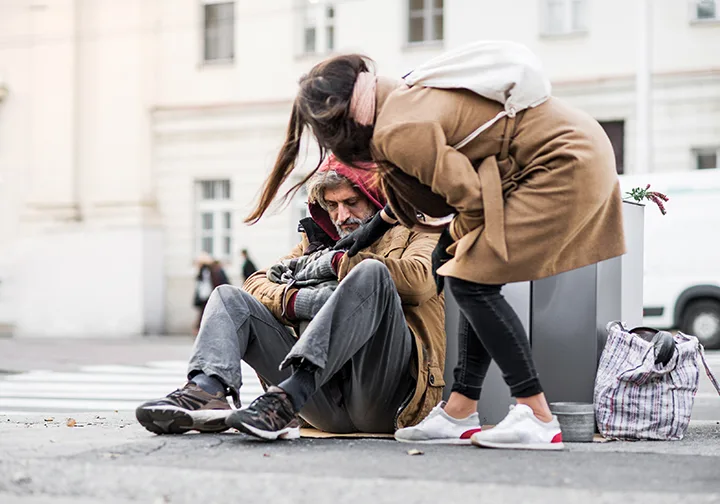
Editor’s note: This is Part 2 of a two-part series on homelessness here in the archdiocese. The first part can be found here.
by Marc and Julie Anderson
mjanderson@theleaven.org
So, how do we as a church and nation end chronic homelessness?
The answers might vary, depending on the community, the individuals being served and their needs.
For example, Eric Arganbright, the director of community engagement for the Kansas Statewide Homeless Coalition in Lawrence, has done some outreach with military veterans. He said oftentimes veterans could find housing, but are not able to furnish it. So, they’d live in an apartment with nothing but a sleeping bag, later returning to the homeless camps simply for a sense of community.
But, when the veterans were given some basic furniture and a few cooking utensils, the abandonment rate went down by 98%.
“Furnishing that apartment is so huge, and finding those resources, especially in rural areas, is challenging,” Arganbright said. “People are kind, but there’s such a large need.”

Arganbright would like decision-makers to focus on solutions, but policymakers need to educate themselves first.
“Take time to listen and chat and work with people who are in the field and who have studied and gone to school and understand what the best practices are,” Arganbright said. The policymakers should not be afraid to implement those best practices on a larger scale.
Christy McMurphy, executive director of the same organization, agreed, as did Barry Feaker, who served as executive director of the Topeka Rescue Mission from 1986 to 2022.
“For us to do our work, we need outreach, especially in rural communities. There’s no funding for that,” McMurphy said. “We need more affordable housing. We need wraparound services and funding for those services, services which are client specific. They need to be what the client needs, not what somebody thinks they need.”
Feaker said how those who are homeless are viewed also needs to be part of the solution.
“Is this a person or a problem? If we’re going to look at them as a problem, we’re going to deal with it one way,” he said. “If we’re going to look at them as a person who has problems — which is all of us —we’re going to handle it a different way.
“So, that’s where we start. If we find out who the person is and we then try to unpack the problems they’re experiencing, we have a better chance of having a better understanding of what to do.”
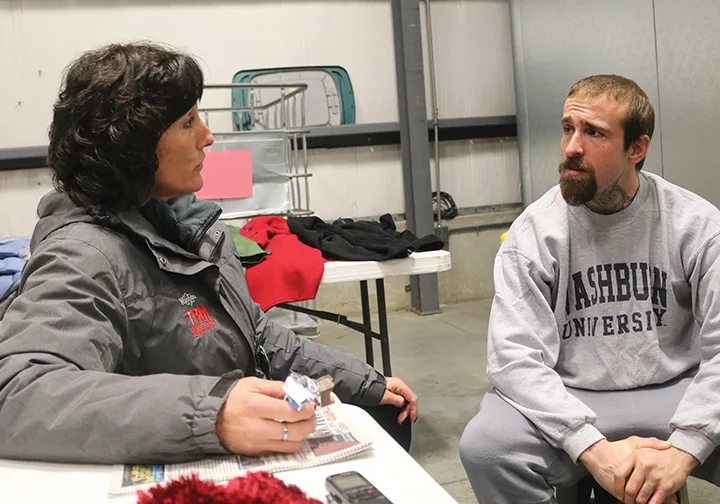
In his interactions with policy-makers, in particular, said Feaker, “There are three main things I’ve been telling people: We all need a healthy relationship; we all need opportunity; and we all need some guidance.”
Feaker doesn’t totally agree with the old adage about teaching people to fish and you’ve fed them for a lifetime.
“You can teach somebody how to do something all day long,” said Feaker. “But if they can’t get a job, don’t have legs to walk, don’t have a car to drive, don’t have anybody that will hire them because they don’t have an address — now you’ve eliminated the opportunity.
“You’ve given them a fishing pole with no fish in the pond.”
Solutions that actually work
Those ideas, said La Manda Broyles, executive director of the Topeka Rescue Mission, are not necessarily popular with policy-makers.
“Homelessness has become a topic that is talked about in homes, talked about politically, talked about on national levels, local levels, but I feel like people are talking more about opinion than . . . facts or from experience doing the work,” said Broyles. “There’s not a quick fix with homelessness.
“We’re really working hard to find out the why. . . . And right now, that’s not popular because it takes time. It’s relationship building. It takes resources. There are opinions saying that we’re enabling, and I will challenge any of that to say, ‘No. We’re building relationships so that people can transform their own lives and walk alongside them while that’s happening.’”
McMurphy and Arganbright want policy-makers to focus on solutions that actually work.
“Don’t be afraid to invest in solutions that actually work. Housing works,” McMurphy said.
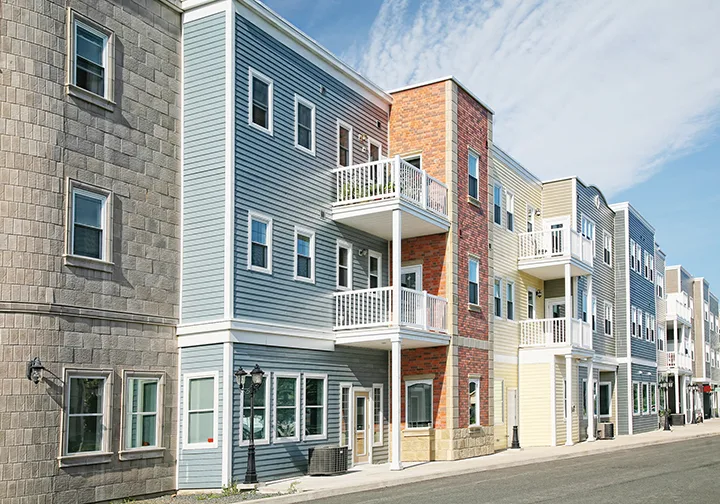
Denise Ogilvie, chief mission integration officer for Catholic Charities of Northeast Kansas, agreed.
For decades, she said, the amount spent on housing has been calculated as 30% of one’s income.
“That has been the standard in America forever, and 30 percent includes your mortgage, your taxes, your insurance and your utility bill. That’s what the bank uses to loan money,” she said.
But it’s not an accurate reflection of today’s housing market.
For example, in Wyandotte County, the poorest of all 105 Kansas counties, Ogilvie said more than 55% of renters pay more than the standard amount. In Johnson County, a county in some ways much more affluent, the percentage of people paying more than the standard amount has risen to 39%.
“We would call those families cost-burdened, and we would also say they are housing insecure because they’re one month away from something happening.”
Asking if society is even providing affordable housing anymore, Ogilvie said in some communities, especially rural ones, there’s not only a lack of affordable housing, but a lack of housing period.
‘Built for zero’
Affordable housing, John Krehbiel said, is key.
He is a member of Justice Matters, an interfaith organization that exists “to move Lawrence toward a city where justice rolls down like a mighty river; to surface, understand and address issues of justice in the region; and to strengthen understanding of the scriptural imperative to do justice.” Krehbiel also serves on the Lawrence Community Shelter’s board of directors as well as other boards, work groups and committees.
Three years ago, Justice Matters became one of the driving forces behind getting the city of Lawrence and Douglas County to commit to being a “built-for-zero” city.
“What we have done historically with the subject of homelessness is said community by community by community, ‘What can we do to manage it better than we managed it last year? What can we do to manage it better?’ All the conversations have always been around the word ‘manage it,’” he said.
“When a community decides to change the narrative from managing homelessness to ending it, that’s a different conversation,” he added.
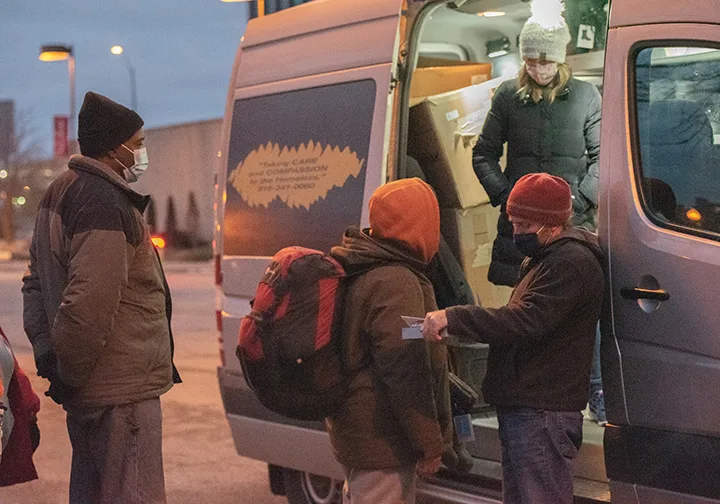
Krehbiel noted most service and advocacy organizations in Lawrence, Kansas City, Kansas, and Topeka have adopted the same mindset, even though city leaders may not be there yet.
Reaching functional zero, Krehbiel said, means a community has created the infrastructure “whereby homelessness becomes rare. It becomes brief, and it becomes non-reoccurring.
“When you go down the road of reaching functional zero, you learn very quickly that without housing, you’ll never get there.”
On any given night, Trey George, a member of the task force and chief executive officer for the Topeka Housing Authority, said the housing authority helps to provide 4,000 people with roofs over their heads. Of those, at least 68% are elderly or have a disability — mental or physical. He agrees that wraparound supports are needed, too. He’d also like to provide even more housing options.
Wraparound
Along with housing, Krehbiel believes that support services are necessary for those experiencing homelessness to be able to “change their life, change their mind, change their habits, change everything — in other words, the transformation.
“Just the housing won’t do it. With just housing, you’ll have reoccurrence.”
That was the experience of Sister Vickie Perkins of the Sisters of Charity of Leavenworth.
According to Sister Vickie, retiring in April from her longtime and pivotal role at DePaul Leavenworth Attainable Housing, providing affordable housing to those in need has to be just a part of a larger program. That larger program needs to also provide wraparound services and supports for it to work.
First, participants have to meet regularly with a financial advocate.
“If they’re coming to us for housing, there’s some kind of financial problem,” she said. “So, let’s get somebody who can help them.”
The second pillar, Sister Vickie explained, focuses on health care — both physical and mental. Clients, she said, agree to address their health care needs either at St. Vincent Clinic for physical health or the Guidance Center for mental health needs, both in Leavenworth.
The third pillar is community. The idea is to bring all of the clients together for a monthly activity.
“Most of these folks don’t have a support base,” she said. “They don’t have somebody they can call if they need something.”
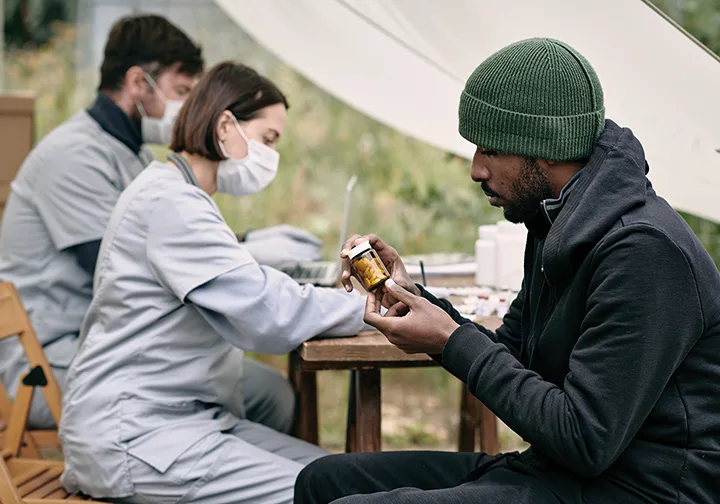
The fourth and final pillar relates to the house itself. Clients agree to weekly, hourlong meetings with a housing support specialist.
“He’s in the house, so he knows the house is being taken care of,” Sister Vickie said. “He sets goals with them, talks about what they need to do in order to meet those goals. . . . He finds out so many things during those weekly visits that we can address.”
“We’re not going to end homelessness if we don’t have someplace for people to live,” she concluded. “Having someplace for them to live means having the support they need to be able to stay in that house.”
‘They feed souls’
Lee Alderman has seen that firsthand.
Trained as a behavior analyst with a doctorate in education and child psychology, Alderman has been executive director of the Emporia Rescue Mission since 2009. He puts his formal training to use in assessing each guest’s particular needs.
What are their abilities? What type of job might best fit them? If they get a job, what type of transportation do they need? Do they need to apply for governmental assistance for a physical or developmental disability? Do they need services to treat a mental health diagnosis?
With a staff of three, 200 volunteers and a budget of $100,000, the shelter is licensed to house 20 guests. On an average night, though, the shelter houses about 15.
The average guest, usually 33 to 35 years in age, stays around two to four months. During that time, Alderman surrounds them with love and tries to address all their needs by linking them to community resources.
“We try to get their mental health taken care of [as well as] their physical health,” he said. “We have a retired Kansas Works employee who focuses on getting the men jobs. . . . He’s retired, but he goes [to the shelter] three days a week.”
The shelter also works on documentation needs such as IDs, birth certificates, etc.
Most importantly, though, Alderman and his staff provide the men with financial stability through at least three to five paychecks. About once a week, a guest moves into permanent housing, something that Alderman said is “just amazing to see.”
Alderman said the success he’s seen with the men he serves is due to one key factor: trust.
Broyles agreed, saying the Topeka Rescue Mission’s meal ministry provides more than 150,000 meals annually, something which helps build that trust.
“They feed souls,” Broyles said. But they’re also doing more.
“They’re building relationships with our unsheltered neighbors,” said Broyles, “because that unsheltered neighbor might not be ready yet to come into the shelter. . . . Our hope as we’re feeding souls is that one day they’ll say, ‘I’m ready for that next step. I’m ready to begin healing. This isn’t what I’m supposed to do. This doesn’t feel good anymore.’”

Like Broyles, Deacon Mike Denning of Prince of Peace Parish in Olathe sees firsthand the importance of building trust.
As a member of a mobile street outreach known as Uplift, he and other volunteers load a van every week with food, clothing and other essential supplies, all of which are distributed to the homeless wherever they live. Typically, the organization serves 250 to 400 people per night.
For example, during the extreme cold this past January, the deacon estimated that Uplift distributed more than 350 zero-degree sleeping bags.
Deacon Denning goes out on the first, third and fifth Saturdays, always working the same route. As a result, he has the chance to build trust with those he serves.
“I’m looking individual people in the eye, and then we’ll exchange something,” he said. “The relationship grows a little bit deeper, and trust starts to build.”
Trust, he said, is “super critical” in helping people in addressing the root causes of someone’s homelessness. As both organizations provide food, shelter and supplies, they also try to provide referrals to community resources in order for their clients to exit homelessness quickly.
At the end of the day, said Deacon Brad Sloan, longtime member of Topeka Rescue Mission’s outreach team, it’s important for Catholics to ask themselves what Jesus would do.
“We know that Jesus himself had a preferential thing for the poor, for the disenfranchised, for widows and orphans, people that were suffering,” he said. “I think that it is one of the key things that we’re taught by his earthy life.
“That is what is at the core of Catholic social justice: that preferential treatment of the poor and the disenfranchised, those people that are marginalized.
“I get choked up talking about it. I have a big lump in my throat right now, and I’m trying not to cry. But when we look at our brothers and sisters struggling in that way, what is it that you see? What is it that you truly see?
“Is that your brother? Is that your sister? Or do you see something that just needs to be swept out of the way because it’s bothersome for you?
“That’s where the relationship piece comes in. If you see these individuals in the way Christ sees these individuals, how can you turn away? How can you ignore it?”
Ways to help those who are homeless
The Kansas Statewide Coalition has a list of emergency shelters and advocacy organizations serving those in need across the state available on its website at: kshomeless.com/kshc/resources. Also, quick online searches for emergency shelters or organizations serving the homeless within a community typically yield a lot of information.
There are numerous organizations across the archdiocese as well, including the Little Brothers of the Lamb, the Little Sisters of the Lamb and the Poor of Jesus Christ, that provide opportunities for archdiocesan Catholics to get involved, whether on the ministry or the advocacy side. Or, as individuals, Catholics can:
• Pray for those experiencing homelessness and those serving them.
• Carry snacks or bottled water with you, ready for distribution if you encounter someone in need.
• Educate yourself and others on the topic by suspending judgment and learning the facts.
• Attend public meetings at all levels of government.
• Choose elected officials wisely by being aware of their voting records.
• Volunteer your time consistently and regularly at a service organization.
• Contribute financially to organizations already engaged in solving homelessness.
Voices of the homeless
Rhudy
A guest at the Emporia Rescue Mission
On those who are homeless in general
“Even though there are so many similar backgrounds, everyone is carrying their own story. Oftentimes, they carry a lot of hurts, and that can lead to poor choices. Also, circumstance in itself can lead to homelessness. There are people out there who do not have the resources and the ability to care for themselves. Some people function on a level that can get them by, but would really benefit from . . . us, the body [of Christ], to reach out and be the hands and feet to those who might not seem like they can be helped.”
On what he wished policymakers knew and understood
Noting that some charities and private citizens across the country have been fined for providing meals or a sleeping bag, Rhudy said, “Our elected officials are shutting them down. I understand the necessity of keeping public areas clean but creating these deterrents into the infrastructure around train stations and bridges, such as spiked bridges, is cruel. Allow the goodhearted people to help. Don’t get in the way because, if nothing [else], there are organizations, largely church-based, that want to provide care and shelter for people.”
On how others can help him and others in similar situations
“Keep your eyes and ears open for someone in need. If you have that focus, you will find people in need. Maybe it’s just someone who needs a pat on the back. Maybe it’s someone you come across every day. Develop a relationship with them. Learn what put them in that situation. Be open to the Holy Spirit’s moving because he will move upon us with compassion. That is the number one cure for homelessness, I believe.”
Ron Jarowitz
Lead supervisor, Emporia Rescue Mission
On how he tries to help the other guests
“The main thing is love. I tell the guys I love them. I want them to know that because that’s why I’m here. I love what I do. I love the guys that come in here. I totally believe that if I show them love, they’re going to take it in like a sponge. If I show them love, it means somebody cares about them. Society has kind of cast them away.”
On what he sees policymakers doing with tax dollars
“How are people not that important? You can take that money and help these people. Why is that money going other places?”
Mindy
A guest at Topeka Rescue Mission’s warming shelter
On who is homeless
“It could be anybody. Everybody goes through hardships. . . . What if it’s you out there needing help — no money, no job, no nothing — and you’re trying to survive?”
On what she wished people would do for her and others like her
“Sit down with someone and get to know them.”
On why she helps others, even though she herself is homeless
“I enjoy helping out others, even though I don’t have anything. It’s how Jesus is. Even if it’s my last bit of money or my last bit of food, I’ll give it to whoever needs it. . . . I know how it is not to have something.”
Ryder
A guest at the Topeka Rescue Mission
On his situation in general
“I came to be with my mom. She’s having trouble with bills and stuff, homeless as well, but I’m here, trying to get things going again. I love to work, but right now with the weather conditions and no vehicle, it’s tough.”






